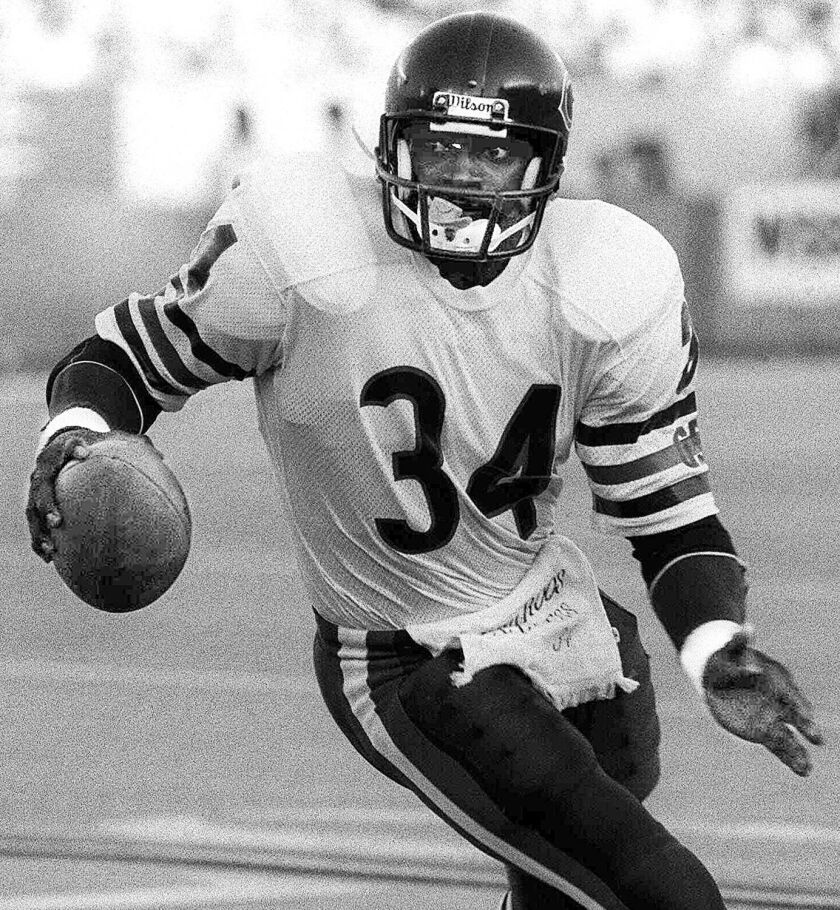A letter containing a death threat against all-time great Bears running back Walter Payton was mailed to the team’s Lake Forest offices, and the FBI was called in to investigate, according to a file the FBI kept on Payton that’s now part of the Chicago Sun-Times “The FBI Files” database of federal records on people, groups and events of particular interest to Chicagoans.
Dated Jan. 6, 1982, the letter starts out cordially enough, with “Dear Mr. Payton.”
Then, the writer indulges in a bit of self-reflection:
“Just a short note to say, I do not like being an OPEN BOOK!”
Quickly, the letter gets to the point:
“When or if ever I see you and a mutual friend of yours . . . I am going to KILL both of you.”
“To refresh your memory: Do not get your paper on time, neighborhood not protected, dog will not come to you.”
The note doesn’t name the “mutual friend,” and it ends with a bit of a head scratcher:
“October 10, 1981 and etc., etc.”
That was the day before a football game that saw the Bears lose 24-7 to the Washington Redskins at Soldier Field. Payton carried the ball just five times for five yards in that game.
The 1981 season, under coach Neill Armstrong, ended that December with the Bears posting a dismal 6-10 record and Payton rushing for over 1,200 yards.
Ditka was hired by the Bears in January 1982.
Payton died at 45 in 1999 of bile duct cancer.
The threatening letter was addressed to Payton and — based on a redaction by the FBI on copies of the correspondence — signed, although clearly not with the sender’s real name.
The FBI looked for similarities to other anonymous letters and also scrutinized fonts and other markings in the hopes of narrowing the typewriter used, according to Payton’s file.
Looking at the note and the envelope, which listed a Loop hotel as a return address, an FBI official wrote, “No watermarks or indented writing of value.”
Investigators found that “the questioned typewriting . . . most closely corresponds with Laboratory standards for an IBM proportional style of type,” according to the file. “This style of type can be found on several brand name typewriters, an example of which is IBM Executive.”
Several “latent fingerprints of value” were lifted from the letter and envelope, but the file doesn’t say whether they were linked to anyone.
The “postal meter stamp” on the envelope was traced to a local law firm. Its name was blacked out in the Payton file, though the records show a company official told the FBI the firm “is basically involved in real estate corporation transactions and has no contact with the Chicago Bears.”
It appears the NFL forwarded the threatening note to the FBI in June 1982. By the following month, Payton had not been formally interviewed, but a conversation with agents was being “arranged.”
The outcome of the case wasn’t described.
This wasn’t the only threat Payton received, according to news accounts. One, downplayed as a “crank call,” was phoned in to the Chicago Park District’s switchboard in 1979 as the Bears were losing to the New England Patriots at Soldier Field.
Another threatening call came in 1978, with the caller warning that “four riflemen would zero in on Payton if he played against the St. Louis Cardinals,” the Sun-Times reported at the time.
“A woman fan was struck in the arm by a stray bullet that afternoon, but police theorized that the shooting was not related to the threat on Payton, who played that afternoon.”






